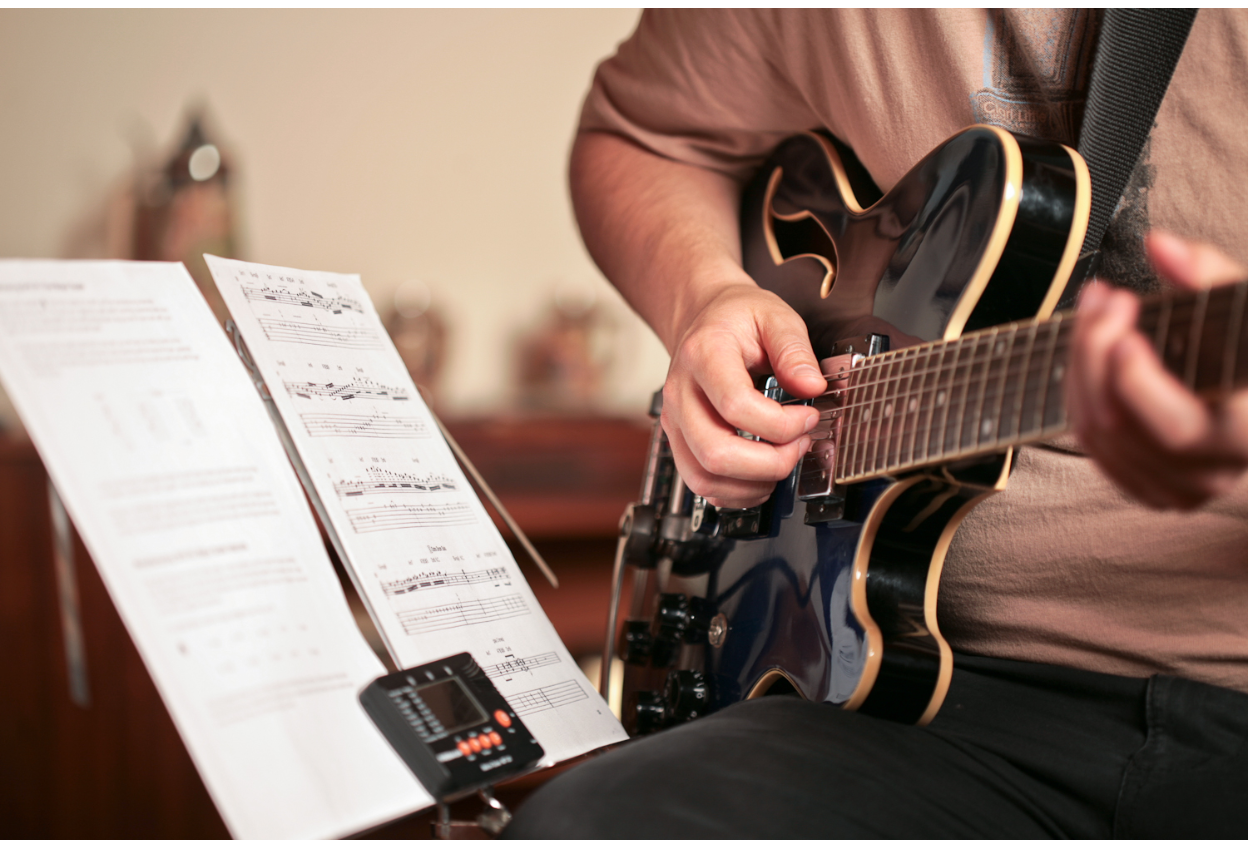3 Tips for Better Guitar Practice
Guest Article
This week’s article is written by Aaron Carrington, owner of Carrington Guitar Academy
How to Stay Motivated & Succeed in Your Passion for Guitar
Contents
Introduction
Sometimes, it can be difficult to find the motivation to practice guitar. As much as you want to get better, there are plenty of things in life that can impact your ability to practice. In this article, we’re going to explore three tips that can help you practice even when you don’t feel like it.
Tip Number #1 - Start With a Realistic Goal
It’s important to acknowledge exactly where you are in your guitar progress and set yourself a realistic goal. Being ambitious is admirable but being overly ambitious can cause more harm than good.
Learning to play the guitar solo from Hotel California after only a couple of months of playing is like running before you can walk. So take stock, ask yourself honestly ‘where am I in my guitar playing?’ and try to take the next logical step in your learning journey rather than leaping into whatever feels exciting.
This way, when you sit down to practice, you won’t have a mountain of work ahead of you and you’re not jaded about your favourite piece of music because you’re not quite ready to play it yet. Instead, you’ll be tapping into something that you know is doable, you’ll feel less intimidated and be more likely to succeed.
Tip Number #2 – Short Bursts of Practice
It’s long been said that one hour a day of practice is optimal for progress. I don’t agree with this entirely, and certainly not in the beginning. Guitar isn’t a one-size-fits all learning process, it’s dependent on the student and their needs.
Yes, if you’ve been playing a while and you’re more accustomed to your instrument, then an hour or more can work wonders when learning specific techniques.
However, for beginners or even experienced players learning something new and difficult (bare in mind that what’s difficult for a beginner and for an advanced player still feels very similar), working in small chunks of time can really help. I normally recommend 15 minutes per day at least 4 times per week.
Then, when you come to practice after a long day you’ve only got a short time to contend with and what’s more, from experience, there’s a good chance you’ll start to enjoy it and exceed this time anyway. Don’t let that initial feeling of ‘I don’t want to’ overcome you.
Also remember that consistency is super important. It’s better to practice 15 minutes for four days per week rather than one hour on one day.
Tip Number #3 – Measure Your Results
I’ve occasionally heard students say ‘I don’t feel like I’m getting any better’ and I believe this is because they overlook their own progress. It’s easy to miss how much better you are than a fortnight ago because your day by day progress can be so small that it goes unnoticed.
It’s sort of like looking in the mirror each and every day to see your progress in the gym. You’re not likely to notice. However, after a month you might see some changes. Guitar playing is the same, you’re not likely to notice the progress you make on a day to day basis but over the weeks and months you will.
With that in mind, I would absolutely recommend setting up a camera and recording your practice sessions once a week. This way, when you feel frustrated, you can look back on your previous sessions and you’ll quickly see the progress that you’ve made.
You can also record your progress in a spreadsheet. If you have specific target tempos you want to hit (if you don’t have a metronome you can use Google metronome) then record the bpm (beats per minute) of each exercise each time you practice. It’s a tiny bit of extra effort for a much more accurate and reliable result.
Have you ever heard the saying ‘what can’t be measured, can’t be improved?’ - it applies here.
Conclusion
In this article we have discussed three valuable practice tips that will help you stay motivated while practising the guitar. We’ve talked about being realistic, practising for short bursts and the importance of measuring your results. If you combine all three of these things, you will certainly start making progress more quickly.
Get started today!
About The Author
Aaron Carrington is the owner of Carrington Guitar Academy, the best place to get guitar lessons in Bath, UK. Since graduating from The Institute of Contemporary Music Performance in London Aaron has played in high profile locations such as Buckingham Palace, The Savoy and The London Eye.
He’s been a regular part of the UK wedding and corporate gig scene and has traveled internationally to the Middle East to play in top quality residency bands 6 nights per week. The finesse gained from this level of playing experience is passed on to his guitar students.
Now permanently in Bath, Aaron strives to deliver the highest standards of guitar teaching at Carrington Guitar Academy by offering a personalized lesson plan tailored to each student’s goals. You may also catch Aaron busking regularly on the streets of Bath. If you're interested in guitar lessons get in touch to book a FREE trial lesson!
Backlink: https://www.carringtonguitaracademy.com


